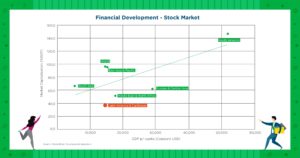Equity Markets and Corporate Governance: A Regional Agenda

(*) With the collaboration of Ignacio Puente
The development of vibrant capital markets is a key challenge common to most Latin American and Caribbean countries. Shallow capital markets affect the region’s productivity, stall innovation, and slow down the adoption of corporate governance best practices.
The gap is particularly pressing in equity markets. As shown in Figure X, the size of stock markets in most Latin American and Caribbean countries (measured as the market capitalization of all listed firms as a proportion of GDP) is below of what it would be expected for their level of development. The region also appears to lag in terms of liquidity, by comparing total value of shares traded in a given year by either GDP or total market value.
IPOs are scant, and there are relatively few listed companies. And even for listed companies, the portion of the company’s shares that float in the market is usually small since they have a concentrated controlling shareholder, typically a family.
Figure X:

How is all this related to corporate governance? Firm’s ownership structure is very closely related to how companies are directed and controlled, corporate governance’s defining question. While each ownership model presents its own governance challenges, underdeveloped equity markets and absent institutional investors are certainly related with poor corporate governance practices. Exceptions, of course, abound.
Going forward, a good governance agenda for the development financial institutions should more thoroughly engage local institutional investors such as pension funds. They, too, should be vectors of good governance as well as suppliers of capital. Doing so successfully will untap vast local capital pools and help create the institutional—governance—channels to more smoothly connect local savings with projects that will lead to the region’s development.■
At IDB Invest’s Sustainability Week in Panama, on June 24th - 28th we will reflect on the value proposition of good corporate governance to foster the growth of capital markets in Latin America and the Caribbean.
LIKE WHAT YOU JUST READ?
Subscribe to our mailing list to stay informed on the latest IDB Invest news, blog posts, upcoming events, and to learn more about specific areas of interest.
Subscribe


